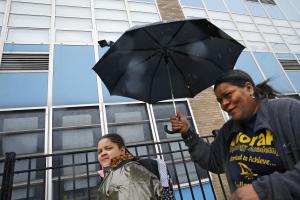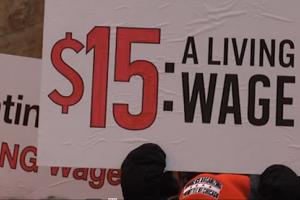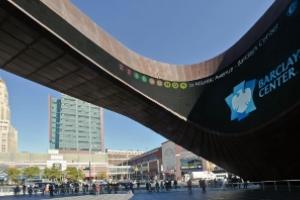Chicago Aldermen Want a $15 Minimum Wage in Their City, Too
In These Times
 Chicago began receiving program money in 2009, roughly a year after the housing market crashed. In the six years since, the city has collected $169 million — of which $140 million went to rehabbing and demolishing homes. But records obtained through the Freedom of Information Act show the city spent money on buildings with luxury finishes in gentrifying areas while distressed properties in some of the city’s hardest hit neighborhoods were left to languish.
Chicago began receiving program money in 2009, roughly a year after the housing market crashed. In the six years since, the city has collected $169 million — of which $140 million went to rehabbing and demolishing homes. But records obtained through the Freedom of Information Act show the city spent money on buildings with luxury finishes in gentrifying areas while distressed properties in some of the city’s hardest hit neighborhoods were left to languish.
 When school starts next year, nearly 70 percent of the public schools in North Lawndale will be in private hands. Most of those schools were failing or under-enrolled when CPS turned the buildings over to charter operators, or fired staff and put the AUSL in charge. Test scores and other data show the privately run schools aren't doing much better academically and in some cases are performing worse than the schools they took over or the district-run schools that remain.
When school starts next year, nearly 70 percent of the public schools in North Lawndale will be in private hands. Most of those schools were failing or under-enrolled when CPS turned the buildings over to charter operators, or fired staff and put the AUSL in charge. Test scores and other data show the privately run schools aren't doing much better academically and in some cases are performing worse than the schools they took over or the district-run schools that remain.
 The results were overwhelming. With 100 of the 103 precincts where the issue was on the ballot reporting, 87 percent of voters were backing the $15-an-hour wage. Just 13 percent voted against the advisory referendum. That huge level of support will strengthen the hand of activists who are encouraging the city council to consider a major wage hike.
The results were overwhelming. With 100 of the 103 precincts where the issue was on the ballot reporting, 87 percent of voters were backing the $15-an-hour wage. Just 13 percent voted against the advisory referendum. That huge level of support will strengthen the hand of activists who are encouraging the city council to consider a major wage hike.
 Mayor Bloomberg pushed through re-zoning of nearly 40 percent of New York City. Bill de Blasio campaigned against urban gentrification. Can the new mayor reverse the trend? Can big-city electoral coalitions buck the trend of the real estate and financial speculators? Author Michael Hirsch reviews the new book about Chicago's mayor Rahm Emanuel - the mayor of the 1% in the second largest city of the country.
Mayor Bloomberg pushed through re-zoning of nearly 40 percent of New York City. Bill de Blasio campaigned against urban gentrification. Can the new mayor reverse the trend? Can big-city electoral coalitions buck the trend of the real estate and financial speculators? Author Michael Hirsch reviews the new book about Chicago's mayor Rahm Emanuel - the mayor of the 1% in the second largest city of the country.
Spread the word